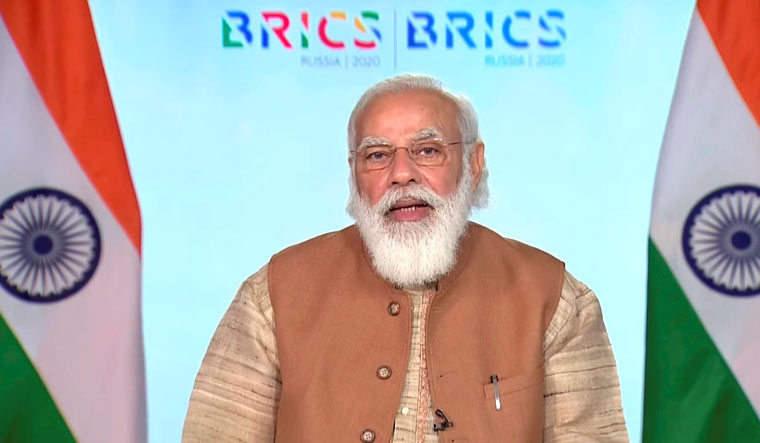Terrorism is the biggest problem in the world and we all need to develop a consensus that countries which support and assist terrorism should be held responsible, said Prime Minister Narendra Modi, while addressing the 12 BRICS (Brazil, Russia, India,China, South Africa) Summit virtually on Tuesday evening.
In a year when the COVID-19 pandemic has been the biggest global disruptor, the prime minister's calling of terrorism as the biggest problem is significant. Over the last few weeks, Europe has been at the receiving end of a series of terror acts. Back home, India has been constantly working on showing how acts of terror—state-sponsored—from across the border have affected stability in the region.
As significant was the prime minister's omission of territorial aggression as a regional de-stabiliser. Clearly, he was not airing any bilateral issues with China on this platform.
Modi spoke about the pandemic, but instead of dwelling on how negatively it had impacted everything, he focused on India's role in rising to the challenges the pandemic has posed. He mentioned that India had supplied essential medicines to over 150 countries, clearly showcasing how India was aptly entitled to being called the pharmacy of the world. He also used the platform to speak about India's vaccine production capability, noting that India's established vaccine production and delivery system would help providing the COVID-19 vaccine to everyone. Modi pointed out that both India and South Africa have proposed that new discoveries for treatment, diagnosis and the vaccine for COVID-19 should be kept out of the ambit of the intellectual property agreements, and hoped that other member nations, too, would support the proposal.
Modi also used the pandemic topic to elaborate on the country's 'Atmanirbhar Bharat' mission which, he said, would become a force multiplier for the global economy in the post COVID-19 era. He mentioned the role that BRICS nations could play in economic revival after the pandemic given that the member nations are host to 42 per cent of the world's population.
The prime minister pointed out that a lot of global governance institutions were facing challenges of credibility and efficiency today.
“They are in this situation because they did not evolve with the needs of the times; they are still stuck in the reality and mindset of 75 years ago,'' he said.
India is a strong advocate for reformed multilateralism, specially in the premier body of the United Nations, the United Nations Security Council. India's new term as non-permanent member of the council begins in January.
India also takes on the BRICS chair next year from Russia.







